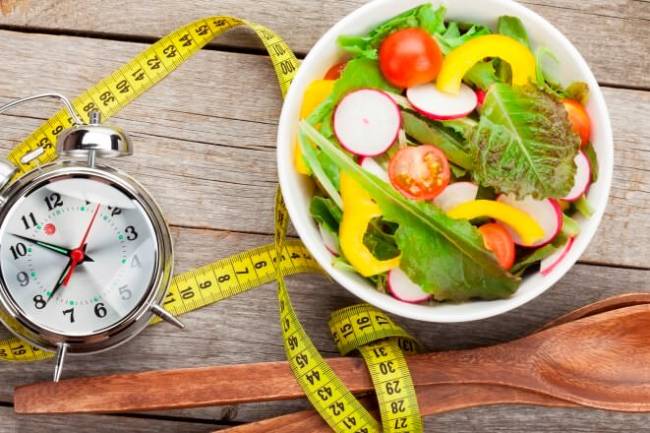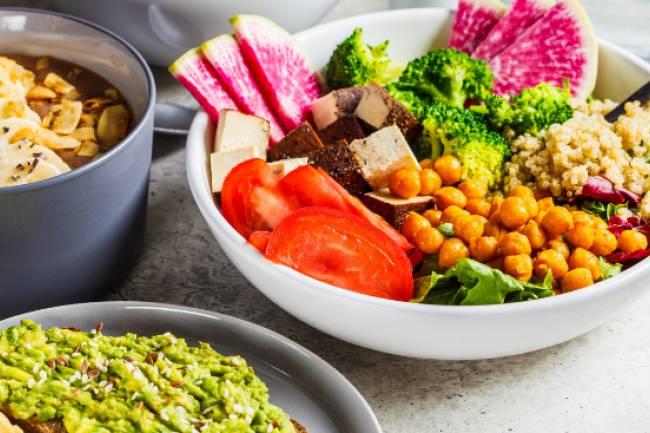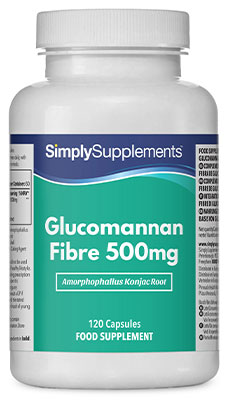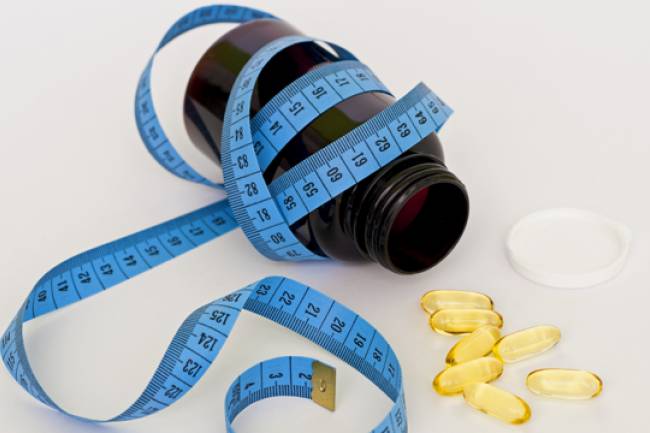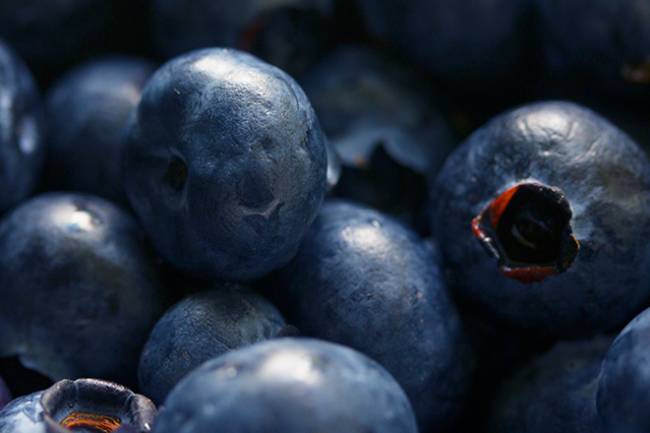Reasons You Are Not Losing Weight on a Diet

Whether for health reasons, or to look and feel better, millions of us every year have something in common: we aim to lose weight. Unfortunately, our efforts are often not reflected in a decreasing waistline, as obesity and the consequences of high body fat levels are only worsening over time. Although there is debate with regards to the exact percentage of diets that work on a long term basis, it is clear that only a small minority of people can lose a meaningful amount of weight, and most importantly, keep it off.
If you are struggling to lose a few pounds despite your continued efforts, this article is for you, as we will explore some of the most common reasons why you are not losing weight and provide expert tips on how to overcome this.
How Fat Loss Occurs
Although “weight loss” is the most commonly used phrase when describing the aim of a diet, this should technically be “fat loss”. This is because weight loss can occur due to a decrease in the size of the muscles, bones, organs and of course water weight. This is not something to be aimed for. What we are all aiming for is to decrease the fat stores in our bodies.
Fat loss occurs when we consume fewer calories than our body requires, as we then have to turn to our fat stores to make up for this energy shortfall. The only way we can lose weight is by burning more calories than we consume. Directly or indirectly, therefore, the reason you are not losing weight is due to an issue with calorie balance. Now we have cleared this up, let's have a look at where many of us are going wrong and what can be done about it.
The Top Reasons Why You Are Not Losing Body Fat
You Have Not Accurately Estimated Your Calorie Requirements
Fat loss fundamentally requires a manipulation of energy intake and expenditure, something scientists call ‘energy balance'. A negative energy balance is what is required for fat loss, whereas a positive energy balance results in fat (or muscle) gain. To lose fat at a healthy and sustainable rate, it is crucial to accurately estimate how many calories you require per day. Although this can be done through scientific methods, most people use an equation such as the Schofield, Cunningham or Harrison-Benedict.
Such equations are quick and cost-free whilst still providing a fairly accurate representation of your basal metabolic rate – or how many calories you burn per day at rest. Once you have adjusted the equation to include the amount of physical activity that you do, you will now have an estimate of your total daily energy needs. However, this is the amount of calories you require to maintain your weight, not lose.
So, you will need to cut a certain amount of calories from this number to stimulate weight-loss. Just how much depends on how quickly you wish to lose weight. A negative energy balance of 500kcal per day will roughly lead to a 1lb loss of fat per week, with a 1000kcal deficit leading to 2lbs lost. It is not recommended that you lose more than 2lbs per week unless you are extremely obese.
Tip: It is very important to input details into an equation which are as accurate as possible. Most people fall-short as they overestimate their physical activity level, which then means the equation subsequently overestimates how many calories then burn per day.
Hidden Calories
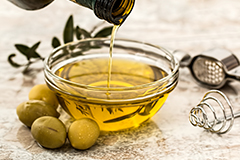 As the name suggests, hidden calories are foods that provide energy and sabotage your weight loss efforts despite being ‘off your radar'. These foods are not usually the main-players in a meal, but still provide a hefty proportion of the calories. Classic sources of hidden calories are cooking oils, spreads, sauces, dressings, toppings, condiments and added sugars.
As the name suggests, hidden calories are foods that provide energy and sabotage your weight loss efforts despite being ‘off your radar'. These foods are not usually the main-players in a meal, but still provide a hefty proportion of the calories. Classic sources of hidden calories are cooking oils, spreads, sauces, dressings, toppings, condiments and added sugars.
Over the course of the days eating these hidden calories can certainly be the difference between the scales not budging, and you stripping body-fat week in week out. Let's explore a few examples of common offenders:
- Cooking oils: 135kcal per tablespoon
- Butter: 102kcal per tablespoon
- Peanut butter: 90kcal per tablespoon
- Mayonnaise: 94kcal per tablespoon
- Parmesan cheese: 130kcal in 30g serving
- Cup of coffee with whole milk and two sugars: ~70kcal
By looking at these examples, hopefully it has become clear how easy it can be to consume hundreds of hidden calories per day. By not taking into account the butter on your toast for breakfast, the mayonnaise in your wrap for lunch, the oil to cook your stir fry for dinner, and the calories in your daily hot beverages, you could easily be consuming upwards of 500kcals more than you thought.
Tip: Try and keep your diet relatively simple, with uncomplicated meals that only use a handful of ingredients. This way, you should be able to accurately quantify how many calories you are consuming and not fall foul of the array of hidden calories.
Overestimating Physical Activity
As mentioned earlier, one of pitfalls of calculating your calorie needs is that people often overestimate how much exercise they actually perform. Not only that, people often reward themselves with food after performing an exercise session, not knowing that they have probably consumed more calories than they actually burnt. Although not always the case, the chances are that if you need to shed some excess pounds your fitness levels will be lacking.
When you are unfit, the amount of time you can exercise for before feeling fatigued is quite short. On a similar note, when you are unfit your body cannot effectively utilise much oxygen. This means that you cannot burn many calories, which is obviously not ideal for fat-loss. This may make you think that exercise is pointless, but this is certainly not the case. As you become fitter, you will not only be able to exercise for longer, but will also be able to work harder and burn more calories.
Tip: If you start an exercise regime, it is crucial to stay consistent with it as it may take a while to reap the rewards of it. That being said, fitness levels should increase quickly and will hopefully be enough to keep you motivated. It's also important to stay disciplined with your diet and not see exercise as a justification for going off track.
Energy Density
When it comes to a fat loss diet, taking into account the energy density of foods should be of primary importance. Energy density is basically a measure of how many calories a food provides per gram. Foods that have a high water and fibre content tend to have a low energy density, whereas fatty foods tend to be high. As foods with a low energy density can fill us up quickly whilst providing a relatively low amount of calories, these are ideal for inducing fat-loss. A point where many of us go wrong is that our diets are filled with foods that provide a massive amount of calories but aren't very substantial. These foods, which often taste great, are easily over consumed.
Tip: Fruits, vegetables, legumes and lean meats are foods with the lowest energy density, so these should make up a large part of your fat-loss diet. Foods that are high in fat and sugar such as cakes, pastries, fried and fast foods are easily overeaten and should be limited.
Snacking
Just like the aforementioned hidden calories, snacks can provide a large proportion of our daily energy intake without seeming of much relevance. Furthermore, we often eat snacks mindlessly which can sometimes mean that we forget we even had them or struggle to quantify how much we actually had. Although there is no argument that nuts are a healthy snack, they may not be the best option for those of us who are trying to lose weight due to their energy density. Even a small portion of nuts can provide upwards of 200 calories which could certainly harm our efforts.
Tip: When aiming to lose body fat, try limiting your food consumption to your main meals of the day. However if you do like to snack, try consuming fruit or raw vegetables as these will not only be healthy, but provide a low amount of calories.
Alcohol and Liquid Calories
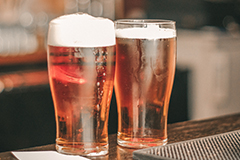 Most nutritionists would agree that you should only consume a small amount of your calories through fluids each day, saving the rest for wholesome and nutritious foods. Not only do beverages not fill you up as well as foods, they can often provide a significant chunk of your daily calories. Those with basic nutrition knowledge understand that sugar sweetened beverages such as milkshakes, fizzy and energy drinks are not ideal as part of a fat-loss diet.
Most nutritionists would agree that you should only consume a small amount of your calories through fluids each day, saving the rest for wholesome and nutritious foods. Not only do beverages not fill you up as well as foods, they can often provide a significant chunk of your daily calories. Those with basic nutrition knowledge understand that sugar sweetened beverages such as milkshakes, fizzy and energy drinks are not ideal as part of a fat-loss diet.
However, the calories in fruits juices are often overlooked because of the supposed health benefits. Fruit juices typically have zero fibre and are almost exclusively sugar. Despite being more nutritionally dense due to its vitamin and mineral content, 330ml of fresh orange juice contains 150kcal and 33g of sugar which fairs no better than a full-sugar can of coke at 139kcal and 35g of sugar! If you wish to obtain the benefits of fruit, it is a lot better to consume whole fruits rather than just their juice.
Alcohol contains 7kcal of energy per gram, which is more than both carbohydrates and proteins (4kcal per gram), and is second only to fats (9kcal per gram). Some alcoholic drinks are incredibly high in calories, with some Long Island ice tea's being almost 800kcal per drink! Even light beers are around 150kcal per pint, which soon adds up after you have had a few. Not only does alcohol provide calories, it can negatively impact other behaviours that harm our fat loss efforts.
For example, how attractive does the takeaway seem after a few hours in the pub? And how unattractive does that planned exercise session the day after now seem? Although having the odd low calorie alcoholic drink isn't the end of the world, ideally alcohol would have no place on a fat loss diet.
Tip: Try and consume as few calories from liquids as possible, saving your daily calorie allowance for food. The best bet is to just consume water, but if you cannot go without fizzy drinks, the calorie-free versions are best. Alcohol should be limited, but if you do have a drink, go for light beers, wine or spirits with a low calorie mixer.
Lack of Sleep
This is a factor that may surprise many, but it is undeniably important. It is known that in the UK over a third of us report that we only sleep between 5-6 hours per night. Although there are many factors at play in the current obesity pandemic, lack of sleep is certainly one of them. Not only does a lack of sleep decrease your energy levels and therefore the amount of calories you are likely to expend, it can play havoc with your hormones.
One result of this can be heightened stress levels in the body, which adversely affects your appetite. Not only are you then drawn towards unhealthy food choices; you also eat more than you normally would. Interestingly, research has shown that even if you have a calorie-controlled diet, sleep deprivation cuts the amount of fat you lose in half compared to those who sleep well. Furthermore, you also feel more hungy, are less satisfied with food and have a decreased desire to exercise.
Tip: To increase sleep quality, try turning off televisions, computers, tablets and phones an hour before bed and ensure your room is as dark as possible. You could also supplement with valerian, 5-HTP or melatonin - compounds known to help induce a good night's sleep.
The Weekend
One of the most common reasons that people struggle to lose weight is because they undo all of their hard work during the week by what they do on Saturday and Sunday. For example, if you cut your calories by 500 per day, you will have a net loss of 2500kcal from healthy eating between Monday and Friday. However, a meal out, a takeaway and some alcohol can easily replace this 2500kcal lost throughout the week.
This means that when you look at the week as a whole, you have consumed as many calories as you have burnt, and therefore not lost any weight. Although you need to sometimes be more relaxed and flexible with your eating to ensure your diet feels sustainable, you need to be smart with this and plan ahead.
Tip: If you know you are going to be socialising at the weekend, try performing an hour of exercise in the morning and eat a low-calorie breakfast and lunch so that you have some room to enjoy yourself in the evening without harming your progress too much.
Eating Out Too Frequently
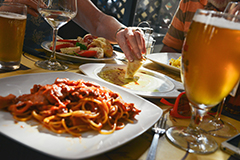 When aiming to lose some body fat, it is a good idea to prepare and cook as many of your meals as you can, as these are likely going to be healthier and contain fewer calories than the shop-bought or restaurant equivalent. Most restaurants have the primary aim of making their food taste good and are not necessarily concerned with making their meals low calorie.
When aiming to lose some body fat, it is a good idea to prepare and cook as many of your meals as you can, as these are likely going to be healthier and contain fewer calories than the shop-bought or restaurant equivalent. Most restaurants have the primary aim of making their food taste good and are not necessarily concerned with making their meals low calorie.
Some restaurants have lower calorie options or even have their calorie and macronutrient information on the menu, but for the most part it is a guessing game. There has been talk of it becoming mandatory to provide calorie information on all food items, but until then, it is recommended that eating out is kept to a minimum when trying to shift some weight.
Tip: If you enjoy eating out or you are away from the kitchen do not worry. To still eat out whilst not harming your progress, it is best to keep things simple. Try ordering a dish that contains a lean protein source with either salad or mixed vegetables. Try and avoid fried foods, sauces and condiments and only consume water or calorie-free beverages.
You Don't Understand Portion Sizes
If you have ever compared your portion size to the recommended one, you are likely to have had a nasty shock. This is not just for a small section of foods as well; this is across the board. The Department of Health are currently working to decrease our average daily calorie intake by 200-300kcals and rightfully, our portion sizes have come under scrutiny. Unfortunately, food packaging can be partly to blame for this, as the picture on the front of the box can often be highly misleading.
For example, the recommended serving size of breakfast cereal is 30g. Nutritionists recently weighed out an amount which accurately reflected the picture on the box of one commonly consumed cereal brand. The result was over 110g - nearly 4 times the recommended portion!
Tip: Developing a better understanding of food labels and portion sizes could certainly help the nation's health and waistline. For a short period of time, it is highly recommended that you weigh out your food so you can see how your portion sizes fare against recommended servings. This will help you quantify how many calories you are consuming.
Your Protein Intake Is Too Low
Protein is arguably the most important dietary component when it comes to fat loss and this is for 3 main reasons. Firstly, protein is very satiating – meaning it helps us stay fuller for longer, thus helping us to avoid overeating. Secondly, protein has a high thermic effect, which means that the body has to work hard to digest it, which speeds up our metabolic rate – great for fat loss. Last but not least, protein helps us to spare our muscle tissue.
When losing weight, the body can often break down the protein in our muscles to use for fuel. This should be avoided at all costs, as less muscle means a lower metabolic rate, which makes fat-loss all the more difficult. So to stop your body using your muscle protein for fuel, we need to provide a rich amount through the diet.
Tip: The current recommendation for protein intake is to consume 0.8g per kg of bodyweight. For an 80kg person, this would be 64g per day. When trying to lose weight however, aim for 1.2-1.5g per kg. For someone who is 80kg, this is 96-120g per day. It is best to spread this evenly throughout the day, so aim for ~35g per meal with a small amount provided through snacks.
Health Issues
Although it is common to hear statements such as ‘I can't lose weight because I have a slow metabolism', it is actually quite rare to have a medical condition that predisposes you to being overweight. In actuality, people who are obese have higher metabolic rates than lean people, as they require more calories to support their higher body mass.
Certainly, there are genetic factors involved in the regulation of body weight and fat levels, but there is no evidence to suggest that a prudent diet and lifestyle cannot ensure a healthy body composition in people with unfavourable genetics. If you are one of the unfortunate few that have a condition such as an underactive thyroid (hyperthyroidism) then fat loss can be more difficult to achieve. In other instances, various medications can also make weight-management an uphill battle.
Tip: If you are confident that you doing all the right things on a fat loss plan but still not seeing a change, it could be worth seeking advice from a healthcare professional to see if there is a plausible explanation behind your struggles. If not, attention needs to be paid to your diet and lifestyle.
You Have Lost Fat but Increased Muscle Mass
 You may think you are doing all of the right things: you are eating a calorie-controlled diet, exercising hard and sleeping well, but the scales haven't budged. You feel totally demoralised and want to give up. But hang on a second – most home scales only measure our mass and do not accurately quantify our muscle and fat tissue.
You may think you are doing all of the right things: you are eating a calorie-controlled diet, exercising hard and sleeping well, but the scales haven't budged. You feel totally demoralised and want to give up. But hang on a second – most home scales only measure our mass and do not accurately quantify our muscle and fat tissue.
Chances are if you are a few weeks into a new exercise regime and the scales haven't moved in your favour, you have lost fat but gained muscle. This will be more likely if you have started weight-training as the body is primed to gain muscle if you have never really done it before. If this is the case, you will be in a much healthier position, but the scales may not reflect this. This highlights the limitations of basing your success purely on the number on the scales.
Tip: Although weighing scales are an important tool, they can often be misleading. So alongside weighing yourself, you could also take measurements of your waist, hips, arms and thighs for example. After all, waist circumference is a much more valid indicator of health than your weight.
You Are Being Impatient
The chances are you didn't gain weight quickly. For most, the pounds will have slowly crept on over months, years or even decades. Considered from this perspective it seems illogical to think that your excess body fat can be stripped away in 28 days, like some of the magazines and diet books would have you believe. So you may be losing weight, but not at the rate you desire.
If this sounds like you, it may be worth putting things into perspective and being patient. Those who lose weight and keep it off are the ones who make behaviour changes that they can sustain. So although you may want to lose weight quickly, getting to your goal weight and staying there is much more important than the time it takes.
Tip: Rapid weight loss is often unsustainable and can cause muscle loss and dehydration that sets you up for a rebound. The best way to go about fat loss is to make improvements to your diet and lifestyle that you know you can maintain.
Once you have this nailed down, the fat loss should follow. If your progress stalls, this is simply a sign that you need to slightly decrease your calorie intake or increase how many you expend.
Summary
Hopefully this article has stimulated some thought with regards to fat loss and has uncovered some of the reasons why you may not be losing weight. Although fat loss is simple in theory, in practice it can be very difficult. As there are so many things that can result in you being disappointed with your efforts, it is important to keep things as simple as possible and be ‘big on the basics'. A healthy diet that is structured to your needs and lifestyle, regular exercise and good-quality sleep should set you up for sustained success.
By doing the right things consistently, you should be able to achieve your goal and reap all of the associated health benefits of your new-found weight.
Sources:
https://ijbnpa.biomedcentral.com/articles/10.1186/1479-5868-6-57
https://www.ncbi.nlm.nih.gov/pubmed/14649371
https://www.ncbi.nlm.nih.gov/pubmed/23107521
http://annals.org/aim/article-abstract/746184
https://www.ncbi.nlm.nih.gov/pmc/articles/PMC4911848/
https://www.webmd.com/diet/obesity/features/why-arent-you-losing-weight#1

 Matt
Matt 